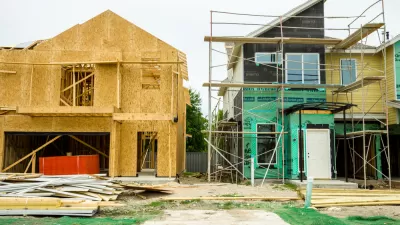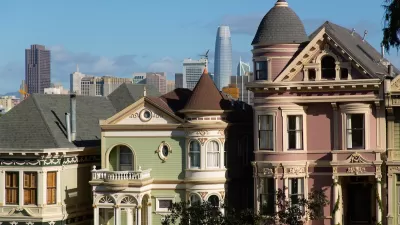NIMBYism served a purpose once, says Scott Doyon, preventing all sorts of heinous projects from being built. But eventually, it became about stopping ALL change. Doyon has some recommendations for changing course.
Scott says that redirecting NIMBYs is firstly about regaining trust:
"You don't have to be a dyed in the wool treehugger, preservationist ideologue or evangelical New Urbanist to acknowledge that, more often than not, the past fifty years of growth and development has resulted in a downward trade. That is, what we've built has been inferior to whatever was lost."
So given that, why should locals trust the development process at all? Doyon explains that there are developers and city planners doing excellent work now and NIMBYs need to learn to "cowboy up and accept that that person is now your ally. Not your enemy."
Thanks to Hazel Borys
FULL STORY: NIMBY Nation: Mad as hell and I don’t blame ‘em. For now.

Planetizen Federal Action Tracker
A weekly monitor of how Trump’s orders and actions are impacting planners and planning in America.

Congressman Proposes Bill to Rename DC Metro “Trump Train”
The Make Autorail Great Again Act would withhold federal funding to the system until the Washington Metropolitan Area Transit Authority (WMATA), rebrands as the Washington Metropolitan Authority for Greater Access (WMAGA).

The Simple Legislative Tool Transforming Vacant Downtowns
In California, Michigan and Georgia, an easy win is bringing dollars — and delight — back to city centers.

The States Losing Rural Delivery Rooms at an Alarming Pace
In some states, as few as 9% of rural hospitals still deliver babies. As a result, rising pre-term births, no adequate pre-term care and "harrowing" close calls are a growing reality.

The Small South Asian Republic Going all in on EVs
Thanks to one simple policy change less than five years ago, 65% of new cars in this Himalayan country are now electric.

DC Backpedals on Bike Lane Protection, Swaps Barriers for Paint
Citing aesthetic concerns, the city is removing the concrete barriers and flexposts that once separated Arizona Avenue cyclists from motor vehicles.
Urban Design for Planners 1: Software Tools
This six-course series explores essential urban design concepts using open source software and equips planners with the tools they need to participate fully in the urban design process.
Planning for Universal Design
Learn the tools for implementing Universal Design in planning regulations.
Smith Gee Studio
City of Charlotte
City of Camden Redevelopment Agency
City of Astoria
Transportation Research & Education Center (TREC) at Portland State University
US High Speed Rail Association
City of Camden Redevelopment Agency
Municipality of Princeton (NJ)





























